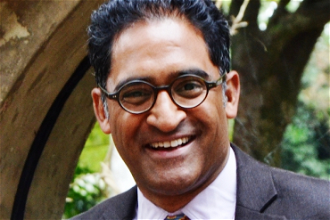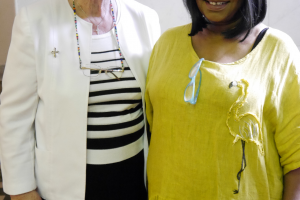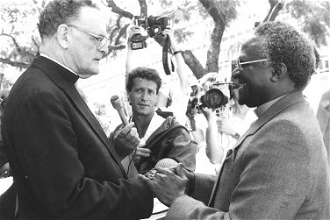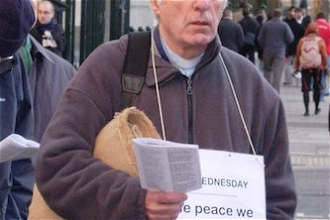Text: Bishop Kevin Dowling on The Joy of the Gospel then and now

Double Alaskan rainbow - Wiki image
Memories, stories, experiences – this is the stuff of life! And this is never more true than when one’s life has been touched in a special way by another human being. My life has indeed been touched so many times and in so many special ways by wonderful so-called ordinary people – who were and are anything but ordinary in the way they have witnesses to me. And I have also been touched by human beings who have been and are mentors in my life. I would like to focus on three of them in particular in this reflection – Archbishop Denis Hurley, Archbishop Oscar Romero and Pope Francis.
His own witness to justice and human rights in the long struggle against apartheid, as well as his warmth, humanity, encouragement and challenge which carried me all through my own years of struggle.....he was a mentor who called me to the cause of justice in the reality of the suffering and oppressed, even of today – which, of course, he had lived in such an exemplary way throughout the long years of the apartheid struggle.
Given his great and prophetic leadership during that struggle, given his commitment to the vision and theology of Vatican II which had been such a profound experience for him of what the Church should become and be, and so much else, it was painful for me to sense his great sadness and disappointment towards the end of his life at what was done to the work of his beloved ICEL – the International Commission for English in the Liturgy - on which he had served with such distinction for several years. The liturgy was another of his great loves, and to celebrate it with the renewal of the ICEL liturgical texts and language had been one of his great hopes. He personally had such a sense for beautiful and flowing English.
I remember how he would listen to the texts of resolutions and Conference meetings, and as one was proposed the remark came loud and clear: ‘That is a split infinitive!’ Yes, I will always carry with me his real sense of loss at the new translations.
And then, my other mentor as a bishop - Archbishop Oscar Romero. It had the wonderful privilege of participating in all the reflections and celebrations in El Salvador in 2005 coinciding with the 25th anniversary of his assassination. I have so many inspiring memories – listening to Gustavo Guitierrez and Jon Sobrino, and the so-called ‘ordinary’ people who had witnessed to their faith in the midst of extreme violence, the hundreds of campesinos, poor rural people who came to pray and sing around the tomb of their Saint – Oscar Romero, in the crypt below the cathedral.
And then, the third mentor in my life today, Pope Francis. At the beginning of his Apostolic Exhortation Evangelii Gaudium, ‘The Joy of the Gospel’, Pope Francis makes clear that this is more like a vision statement about what he believes the Catholic community should become and be in the world......with the focus on being more missionary, the focus of ‘missionary discipleship’, a Church that will be experiences as merciful and compassionate, a Church called to be courageous in its willingness to change and be inserted into the reality of the poor and suffering of the world......
‘I dream of a missionary option’, he writes, ‘that is, a missionary impulse capable of transforming everything, so that the Church’s customs, ways of doing things, times and schedules, language and structures, can suitably be channelled for the evangelisation of today’s world, rather than for her self-preservation.’ His particular passion and focus has been the so-called ‘3 Ps’: prayer, the poor and peace – and he sees prayer, flowing into commitment to the poor and peacemaking as central to evangelisation, and so he is concerned that we should not be overly preoccupied as Church with our internal life and concerns. In this he echoes the words of Romero: ‘We would be false to our mission as shepherds if we were to reduce evangelisation to mere practices of individualistic piety and disincarnate sacramentalism.’ There is nothing wrong with piety and sacramental life. It is just that Jesus invites us to go further.
I believe that Pope Francis’ Evangelii Gaudium – ‘The Joy of the Gospel’ – is a call to re-vision the Church’s mission of evangelisation in the context of the real world of war, atrocities and all forms of violence, and the experience of billions of people, especially the poor and vulnerable – a challenge that is just as relevant for us in Africa as it is for people and the Church in the developed world. It is simply a challenge: How can we tell all these suffering people: ‘God loves you’? How can we enable suffering people to feel, to experience, that God loves them? Throughout the document one comes across ‘pearls’ of wisdom and insight of Pope Francis – ‘pearls’ which cause me to stop, read them again, and take them to heart. These are the words of a true pastor who knows and feels the suffering of the sheep, and who also knows that the conventional responses may no longer be relevant nor meaningful to that reality, and that unless the worldwide Church finds a ‘new way’ to transmit and make meaningful the ‘Good News’ of Jesus, we risk consigning that message to irrelevance.
This new exhortation of Pope Francis is also rather different from previous Papal documents with their particular style of language and expression. It is more like a reflection of a friend and pastor who is just talking to us, sharing with us around the fireside, one who has lived the inspirational call in Gaudium et Spes of Vatican II: ‘The joy and hope, the grief and anguish, especially of those who are poor or afflicted in any way, are the joy and hope, the grief and anguish of the followers of Christ as well.’ (para 1.) This is a pastor who has taken to heart the preamble of the Synod on Justice in the World in 1971: ‘Action on behalf of justice and participation in the transformation of the world fully appear to us as a constitutive dimension of the preaching of the Gospel, or, in other words, of the Church’s mission for the redemption of the human race and its liberation from every oppressive situation.’ (para. 6).
Those inspiring quotes mirror the pastoral approach of Hurley and Romero. There are many examples of this, from Hurley’s response to the child tugging at his clothing whom he discovered was deaf and which led him to build and run an holistic education institution for deaf children.....from this, to the more prophetic stances he took in the face of increasing atrocities committed against the oppressed poor of the country. Or Romero’s personal response to the assassination of his friend Fr. Rutilio Grande, together with the old man and little boy, at whose tombs I prayed in a little village church in 2005 – Romero’s life which from then on became an ongoing commitment to justice and human rights for his people, for whom he became an icon of hope. Those prophetic responses of Hurley and Romero always proceeded from a very personal experience of the suffering of the ‘little ones’ of their society which both of them prayerfully analysed in the context of Jesus and the Gospel, and which led them to make choices which reflected the option of Jesus in the synagogue of Nazareth: ... ‘to bring good news to the poor, to open the eyes of the blind, to set the downtrodden free....’
As with Archbishops Hurley and Romero, I do not experience the approach of Pope Francis, therefore, as a top-down philosophical, theological analysis and guideline for a response of the Church to the critical human and societal issues which billions of our sisters and brothers face, following a natural law approach applying universal principles to any or every particular situation. This is rather a reflective approach of three shepherds, pastors, Hurley, Romero and Pope Francis, who know how to ‘do’ theology ‘at the coalface’, i.e. who know how to prayerfully discern what the Word of God calls us to do in the face of the human struggles faced by the vast majority of humankind. And, in that sense, this exhortation ‘The Joy of the Gospel’ should not only be read, but meditated upon in the presence of God who gifts all of us with insight from the Holy Spirit to apply them to our particular situation – so that we too can be a sign, a presence of hope.
Pope Francis clearly has a holistic concept or vision of evangelisation, viz. that the Church’s mission in the world should touch every aspect of life. The problem for us human beings is that it is difficult for us to concentrate on more than one aspect or facets of a challenge or problem, while at the same time holding in creative tension all the other facets. It is not always easy to have a holistic vision of the issue before us as we try to discern meaningful responses to the suffering poor of the world.
Having spent most of my 23 years as a bishop, and all of my previous life as a priest engaged in justice and human rights issues in South and Southern Africa, other countries in the rest of Africa, and elsewhere in the world, e.g. in the very complex situation in the Balkan region after the war, it has always caused me to pause, think and pose the question: why has justice, human rights, work for global and regional peace, disarmament, etc., as well as advocacy for change in the socio-political-economic and cultural domain been, it seems, at the margins of the Church’s mission of evangelisation, as ‘meddling in politics’ which the Church should not be involved in?
The very fact that the majority of Catholics and others in sub-Saharan Africa and elsewhere experience dehumanising poverty and misery, the effects of HIV/Aids on family and societal life, massive and endemic corruption by politicians and governments, violence, wars, people being forced to flee their homes in the millions, human trafficking, rape as a weapon of war, and abuse of women and girl children, and a lack of hope for their future, etc......well, surely these issues should be at the centre of the Church’s vision and mission of evangelisation, which are then translated into advocacy for systemic change, into witness and campaigns against everything that dehumanises the ‘little ones’ of society, and also a commitment to all the forms of outreach to those who suffer most....so that as a Church we can offer some hope to those who suffer.
This is what characterised the life and mission of Archbishop Hurley....he committed his life with a passion to the process of systemic change in South Africa so that the people could find hope in their long struggle to live in the dignity which was theirs as a right. The question for me is: Are all these issues perceived to be on the periphery of what the Church ‘does’, that these are questions that a few people engage with as part of the Church’s work, but are not central to who and what we are as Church?
Archbishop Hurley, as a theologian in his own right, was at the forefront of renewing the vision of Vatican II and the praxis of the South African Church in the socio-political context. It was Hurley who motivated the Bishops’ Conference to declare apartheid ‘intrinsically evil’. And surely this is the same challenge which Pope Francis is addressing to the entire Church today in its very different contexts throughout the world in ‘The Joy of the Gospel’. We cannot ask or expect the poor and vulnerable ones of our societies to develop and practise a spiritual life, to find the Eucharist a meaningful celebration of their life in Jesus, to experience catechesis as bringing Jesus into their human reality etc......unless we as Church are seen and experienced to be involved in the very struggles of the poor and vulnerable for a minimally decent life. And that means that the Church leadership, in particular, must be seen to be engaged in advocacy and efforts to transform the lot of the poor...to be ‘out there’ in the real world, ‘on the peripheries’ as Pope Francis has called for more than once....to ‘smell like the sheep...’
Yes! To smell like the sheep! In the course of one’s life a person is sometimes surprised by a few words which cause them to stop and think. For example, as I struggled to develop a holistic Church response to the ravages of HIV/Aids in the diocese where I minister, and in the context of millions of people living and dying with Aids-defining diseases in sub-Saharan Africa, I was really challenged by the powerful words of a certain Dr. J.P. Muliyil: ‘How can I understand a figure or a statistic unless I have held the hand that it represents?’ So true; so utterly to the point. The ‘figure’ of 6.2 million sick and dying children and people in South Africa with Aids-defining diseases.....these are unique human beings, and unless I have held their hand as they struggled with their illness or waited for death, I would never understand what Aids is all about. This has led me personally to a conscious commitment since 1992 when I first encountered Aids in the diocese to ‘hold the hands’ of the sick and vulnerable and dying women in particular, but also the men and especially the little children in this diocese and elsewhere.
Aids is not merely a health issue....it is a justice issue in the full sense of that word. For example, as I have experienced many times in the shack settlements around the platinum mines in the diocese....sitting in a terribly hot zinc shack in front of a single mother dying of Aids diseases as she looks in despair at her dying baby, and knowing that she migrated to this shack settlement around the mine shafts in the diocese because of extreme poverty and no job, only to find herself in a worse poverty trap because her only means of survival in the shacks was through ‘transactional sex’ with the miners who had money, leading to HIV infection and a horrible death in the pre-antiretroviral era....a tragedy and appalling injustice for many thousands of such women, a deeply moving challenge to all of us in the Church to re-vision the mission of the Church in the reality of the societies and the world of today....the mission we call evangelisation.
Infection, sickness, misery and death are only part of the story of HIV/Aids. There is also the reality of stigma and discrimination which drives many of the sick into isolation and loneliness, holding them back from seeking the help and support that is available. And some in the faith communities have contributed to that stigma by preaching the shocking message that Aids is a ‘punishment from God’... projecting a pre-occupation with sex and sin, and ignoring the social sin that is the cause of so much injustice, poverty and exclusion of the vulnerable, which is the root cause of the disease.
This is all about the Catholic Social Teaching principle of the ‘preferential option for the poor’. This is not an optional extra which we put on the list somewhere under catechesis, liturgy, and so forth. It invites all of us according to our different callings and ministries to engage with the poor in an ‘evangelisation through transformation.’
In other words, we cannot limit the ‘preferential option for the poor’ to works of charity which will alleviate in some way their sufferings.....works of charity which are also critically important, but not enough if we as Church are to be faithful to a holistic vision of evangelisation. It means we as Church, according to the gifts of the Spirit given to us in different ways, must also be engaged in prayerful analysis of the causes of dehumanisation, disease and misery, and then engage in advocacy and action for change and transformation in the lives of the suffering. It is indeed very difficult to continue to work to transform all forms of injustice and abuse of human rights, so that our people can begin to believe what Jesus promised: ‘I have come that they may have life, and life to the full’ (John 10:10), It is difficult and often discouraging because so much is against us. Pope Francis put this difficulty so succinctly: ‘It means working to eliminate the structural causes of poverty and to promote the integral development of the poor’. That is a major task....but we have resources in the Church everywhere with which to make a response, not alone but together with others.....to make a difference where we are, and where we can.
Pope Francis also centered on ‘systems’ which impoverish people and whole communities and societies......As he said: ‘To sustain a lifestyle which excludes others, or to sustain enthusiasm for that selfish ideal, a globalisation of indifference has developed.’
A ‘Globalisation of Indifference’ which excludes others....a powerful analysis indeed from Pope Francis. We need only to take a brief overview of some of the hotspots of exclusion in our world, and the global indifference which allows such exclusion to continue because strategic or national interests seem always to trump the possibility of global solidarity......the occupied territories in Palestine, the violence and atrocities in Syria and the continuing stream of refugees from this area and other countries where war and violence reigns, like South Sudan in the past months, the worrying trend towards nationalistic ideologies, and so on and so on. In my work with colleagues in Pax Christi International, the list of global and regional issues which renew and deepen the threats to peace in our world is almost endless.....and around this time when the 100th anniversary of the outbreak of World War I is being commemorated, the powerful ones of the world seem to still refuse to learn the lessons of history, and continue to follow the way of war, violence and exclusion. Yes, the ‘globalisation of indifference’ to the praxis of exclusion.
‘Almost without being aware of it’, Pope Francis says, ‘we end up being incapable of feeling compassion at the outcry of the poor, weeping for other people’s pain, and feeling a need to help them, as though all this were someone else’s responsibility, and not our own.’ What is at the heart of the call of Pope Francis is the need to develop the globalisation of solidarity which can and hopefully should transform the suffering of millions of our sisters and brothers through all the forms of active engagement.
In ‘The Joy of the Gospel’ the Pope is also very critical indeed of the enormous gap between the haves and the have-nots. Pope Francis’ analysis is that this is due to the lack of ethically-based standards and decision-making in the global political and economic arena.......As in the time of Archbishop Hurley, so today even after 20 years of democracy, South Africa remains one of the most unequal societies of the world. Millions of our people still yearn for a ‘place in the sun’, even as they suffer the incredible heat of the summer in their zinc shacks. South Africa and so many other African countries, and developing countries in the world, are trying to participate in a global economic system which is ‘weighted’ against them. Many of them find it difficult to ‘compete’ – because that is the name of the game....competition.
The question is: Besides advocating for ethical standards in economic policies and their implementation, how can we as Church participate in the journey towards at least some alternatives to the global systems which exclude, marginalise and impoverish – even with little steps? Pope Francis places a central focus on decentralisation in the Church if there is to be a move towards real change. He clearly recognises that the magisterium in Rome does not have all the answers to the complex problems we face in today’s world..... ‘it is not advisable for the Pope to take the place of local bishops in the discernment of every issue...’, Pope Francis wrote.
I fully agree, but I would add a note of caution. It cannot be presumed either that local bishops, like me, have all the answers to the complex problems we face, both in fundamentally unjust societies and in terms of the regional and local systems which are so problematic. While we can for an authentic practice of the Catholic Social Teaching principle of subsidiarity – that what can be done at the lower level, should not be done or blocked by the higher level – this cannot be restricted to devolving some authority and decision-making processes to local bishops. These local bishops must also devolve the discernment processes which are required to include all the faithful who have so many skills and the experience to enable the Church response to issues to be credible, reasonable, and worth thinking about.
And the local bishops, too, need to reflect often about their common responsibility to renew and sustain a global Church of solidarity, compassion and outreach to those who suffer so much today, a Church on the regional and global level that is actually experienced as being engaged in the issues which imperil the future of our global society and indeed the planet and its resources....to be a global Church which offers hope.
Local bishops, like me, therefore need to be pastors in the mould of Archbishops Hurley and Romero and Pope Francis – not authoritarian decision-makers, but rather shepherds who ‘smell like the sheep’ to use Pope Francis’ phrase, shepherds who call forth the whole People of God into a discernment process, based on reading the current ‘signs of the times’, so that all together prayerfully discern what God is calling us as Church to witness to, to advocate for, to be present to, and to be involved in.....so that the poor and ‘little ones’ of our societies and world can begin to experience some hope and new beginnings. In others words, a call to collaborative leadership on the part of the bishops.
To sum up. Pope Francis does not want our parishes or communities to be focussed inwards, but to be people of faith who are ‘bold and creative’, and that the bishop as pastor is sometimes called to lead, but also at other times to walk behind the flock, listening and discerning, and encouraging them to ‘strike out on new paths’. Working with Archbishop Hurley in our Bishops’ Conference Justice and Peace Commission, I remember so well when we met before plenary sessions of our Conference which we would address, he would always ask the question: what are the current justice issues which need to be reflected on and addressed? He wanted us to have the courage to ‘strike out on new paths’, never to be complacent, to always seek to be relevant to the real concerns of the time.
And, because of the solidarity and support of people and communities here in the UK, the Denis Hurley Centre at the cathedral in Durban (at present being constructed) will ensure that his legacy will live on for many more years through all the programmes of social outreach that it will house. I want to thank all of you in the UK, and especially the Denis Hurley Association, for helping us in South Africa to enable his witness to continue to touch the lives of the poor and marginalised in the wide area to which this centre will respond.
All 74 parishes in the Archdiocese of Durban will be having a special collection at all Masses over the weekend of 26 and 27 July. In his letter to parish priests, Cardinal Wilfrid Napier OFM writes: ‘The Denis Hurley Centre is one of the biggest and most ambitious projects undertaken by the Archdiocese. The collection on 26 and 27 July will have a special significance, because the building will be completed by the end of September and we will have to pay the full R31.2 million by that time. Please will every parish give generously to this worthy cause, for the sake of the poor and vulnerable groups who will be served by this building...’
As I have noted earlier, Pope Francis in ‘The Joy of the Gospel’ calls the Catholic Church to be more ‘missionary’ in the widest and most holistic understanding of the concept. But he warns that, unless we do this, then the alternatives will not be so pleasant. ‘We do not live better when we flee, hide, refuse to share, stop giving and lock ourselves up in our own comforts.......such a life is nothing less than a slow suicide.’
Powerful words, yes, but nonetheless an invitation to walk the path of a more relevant evangelisation, which is faith-filled prayer in the context of our daily experiences, and action for peace, justice and hope in all the communities and situations in which God calls us to share our gifts and ministries.
I believe Archbishop Hurley would have avidly read and rejoiced in ‘The Joy of the Gospel’ of Pope Francis, as would Oscar Romero, three great pastors, true shepherds, prophets of their time......and so, too, we can reflect on and rejoice in continuing to hear and respond to the ‘voices of God’ which we have heard in them and in those around us today. And so, we must continue our pilgrimage together so that, wherever we are, Jesus can become incarnate again and people can experience that there can indeed be hope, new beginning and good news for the poor, and that all the downtrodden of God’s world may sense with joy that they can become free and can live in peace and in dignity which no one and nothing should take from them.
Let us become, as Pope Francis calls us to be, a ‘caravan of solidarity’.
Thank you.
Bishop Kevin Dowling C.Ss.R.





















